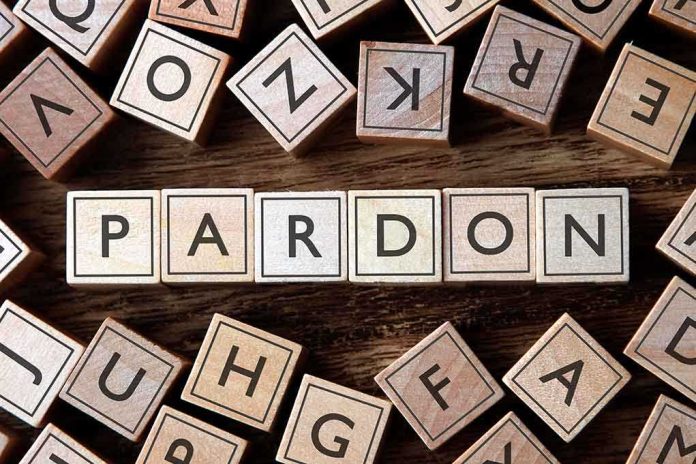
Donald Trump’s unprecedented mass pardons for January 6-related crimes could redefine American justice and democracy.
Story Snapshot
- Trump issued pardons for nearly 1,600 January 6 defendants on his first day back in office.
- The pardons were framed as a remedy for “national injustice” and for “national reconciliation.”
- This move was the first of its kind for crimes against the democratic process, sparking legal and political debates.
- Critics argue this action undermines law enforcement and may encourage future political violence.
Trump’s Historical Clemency
On January 20, 2025, Donald Trump issued a sweeping presidential clemency for nearly 1,600 individuals connected to the January 6, 2021, U.S. Capitol attack. This marked the first day of his second presidential term. The pardons were an attempt to correct what Trump called a “grave national injustice.” Trump’s decision has been interpreted as a bold political statement, emphasizing loyalty to his supporters and challenging the conventional rule of law.
These pardons included full pardons and commutations, affecting both convicted individuals and those awaiting trial. This decision was made against the backdrop of ongoing claims by Trump that the 2020 election was “stolen,” a narrative that fueled the Capitol attack. The move was met with sharp criticism from legal scholars and the Justice Department, who argued that it undermined federal law enforcement efforts.
Legal and Political Ramifications
Trump’s use of mass pardons for crimes challenging the democratic process is unprecedented. Legal experts have voiced concerns about the potential erosion of judicial authority and the risk of setting a dangerous precedent for future presidents. The pardons have sparked significant political debate, with many viewing them as a green light for future acts of political violence. The Justice Department has expressed strong opposition, arguing that these pardons undermine their prosecutorial efforts related to January 6.
President Trump pardons a long list of 77 allies for their support or involvement in alleged plans to overturn the 2020 Presidential Election. Here are some key individuals who received clemency from the President from the Live Desk this morning! pic.twitter.com/V95JYgmJuU
— Dante Ricci (@DanteRicciWX) November 10, 2025
The political landscape is deeply divided over these pardons, reflecting wider societal polarization. While some Republican politicians have supported Trump’s decision, viewing it as a necessary step towards “national reconciliation,” the majority of legal experts and Democratic leaders see it as a threat to democratic norms and the integrity of the justice system.
Impact on American Society
The immediate impact of these pardons is the release of hundreds of individuals, many of whom have been portrayed as “political prisoners” by Trump and his allies. This move has demoralized law enforcement and prosecutors who worked tirelessly to hold those involved in the Capitol attack accountable. In the long term, there is a concern that such actions could normalize political violence and erode public trust in the justice system.
Beyond the legal implications, these pardons have significant social and political consequences. They have deepened the partisan divide in the United States, with many fearing that Trump’s actions could embolden extremist groups. The decision has also raised questions about how future presidents might use their clemency powers, particularly in politically charged contexts.
Expert Opinions and Future Outlook
Experts in law and counterterrorism have been vocal in their criticism of Trump’s pardons. These professionals warn that such actions may encourage future political violence by signaling that crimes committed in support of political figures could go unpunished. Legal scholars argue that this use of clemency power is an unprecedented abuse that undermines accountability and the rule of law.
As the United States moves forward, the political, legal, and social ramifications of these pardons will continue to unfold. The debate over the balance between justice, political loyalty, and presidential power will likely intensify, shaping the discourse around democracy and governance in America. The long-term impact of this decision remains uncertain, but it undoubtedly sets a significant precedent for the use of presidential clemency.
Sources:
Wikipedia: Pardon of January 6 United States Capitol attack defendants
U.S. Department of Justice: Clemency Grants by President Donald J. Trump (2025-Present)









